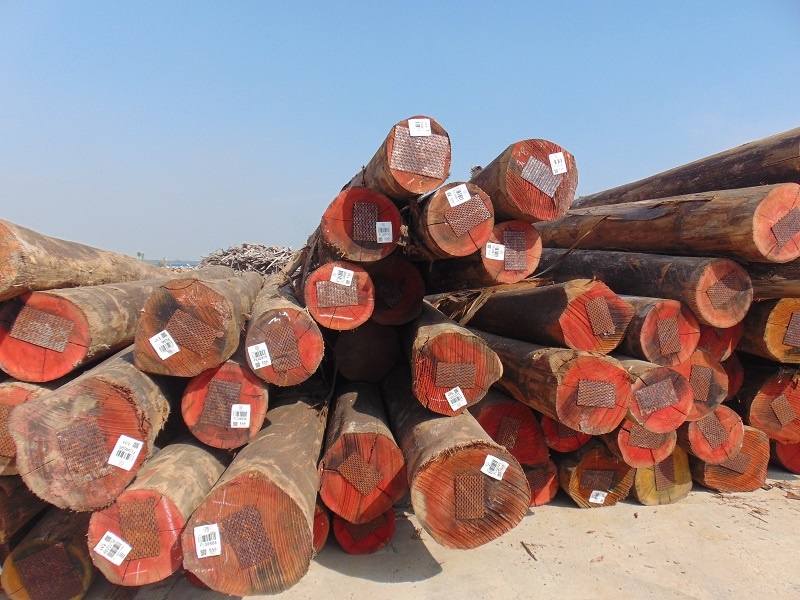Wood, frozen chicken thighs, apples, cherries, some nuts,… when imported into Vietnam from March 31 will be subject to new preferential import tax rates, in which wood and wood products will have their import tax reduced from 20 – 25% to the same tax rate of 0%.
The Government has just issued Decree 73/2025 amending and supplementing preferential import tax rates for a number of items. Accordingly, import tax is reduced across a number of items such as cars, wood, ethanol, frozen chicken thighs, pistachios, almonds, fresh apples, cherries, raisins, etc. The Decree takes effect immediately on March 31.
 |
|
From March 31, wood and many other items imported into Vietnam will be subject to new preferential import tax rates. |
In particular, for wood and wood products, specifically: Group 44.21 includes wood products (including products such as clothes hangers, thread spools, yarn tubes and bobbins, sewing thread reels and similar products, wooden bars for making matches, etc.); Groups 94.01 and 94.03 include chairs and parts of chairs, wooden furniture, etc., reducing import tax from 20 – 25% to the same tax rate of 0%.
Previously, the Vietnam Timber and Forest Products Association (Viforest), the Handicraft and Wood Processing Association of Ho Chi Minh City (Hawa) also recommended considering amending the import tax rate on wood products from the US to minimize the risk of retaliatory measures from the US.
It is known that Vietnam is the largest supplier of wood and products to the US. Last year, the export turnover of these items was 9.1 billion USD.
Most of the wood products exported to the US market are in the refined group, such as wooden furniture. These items are currently enjoying a 0% tax rate.
Meanwhile, in the opposite direction, Vietnam is applying a tax rate of 15 – 25% on these items. During the past time, when US President Donald Trump announced that he would impose reciprocal taxes on all goods from other countries, many Vietnamese wood enterprises were also concerned because Vietnam’s import tax rate was higher.
However, according to the new Decree, the import tax rate on wood and wood products will be reduced to 0%, equal to the tax from the US.
Enterprises highly appreciate and respond to the import tax reduction policy recently issued by the Government.
Mr. Ngo Sy Hoai – Vice President of Viforest said: “The Government’s decision is a great encouragement and we hope that the US will consider it fairly, transparently and appropriately so as not to impose reciprocal taxes on wood products that we export to the US market. It can create competition between wood products produced in Vietnam and imported wood products. I think that processing enterprises serving the domestic market must also share and need to improve their competitiveness”. Assoc. Prof. Dr. Nguyen Thuong Lang – Institute of International Trade and Economics, National Economics University, assessed that the US President’s reciprocal tax strategy applied to all countries may be short-term. He appreciated the quick decision from consulting agencies and the Government. Currently, Vietnam has reduced taxes to 0% on wood products, the reciprocal tax factor can be eliminated. However, Dr. Lang also noted that some other industries could also be hurt if they were subject to reciprocal taxes. These include electronics, machinery and equipment, textiles, and footwear. In addition to wood, these are the industries that account for the majority of export turnover to the US. The revenue of many export enterprises is highly dependent on this market.
Similarly, according to Dr. Pham Tat Dong – Institute of Price and Pricing Strategy (NHC), for consumers, this regulation brings many obvious benefits. Adjusting import tax reductions on a variety of consumer goods will help reduce the cost of imported products that are not yet produced domestically or are not produced to high standards. This will increase consumer choice and can help them access international quality products at lower prices, thereby saving a lot on living expenses. At the same time, tax-reduced items will stabilize prices in the market and support businesses in the context of increasingly fierce international competition.
Reducing import taxes also creates opportunities for international products to enter the domestic market at more competitive prices, promoting product diversification. Consumers will have more choices in terms of types, brands and quality. Increased competition in the market not only helps consumers access better products but also encourages domestic enterprises to improve the quality of their products to maintain their position in the market, creating a healthy competitive environment where both imported and domestic products must continuously improve to meet the increasing needs of consumers. In addition, when import taxes on production materials are reduced, input costs for domestic manufacturing industries will also decrease. This helps businesses save on production costs, thereby increasing the ability to supply raw materials to industries. Lowering tariff barriers also promotes trade shifts, expands international cooperation opportunities, and creates conditions for domestic enterprises to access high-quality raw materials at more reasonable costs, thereby improving production capacity and product quality.
However, Associate Professor, Dr. Nguyen Thuong Lang also suggested that after the move to quickly reduce tariffs on a series of imported goods, Vietnam should apply some further solutions, which are to step up the search and expansion of import markets, reduce over-reliance on one market; increase cooperation with US enterprises to produce for export to the US; increase imports of high-end medical equipment, liquefied gas, consumer goods, agricultural products for animal feed production, etc.



